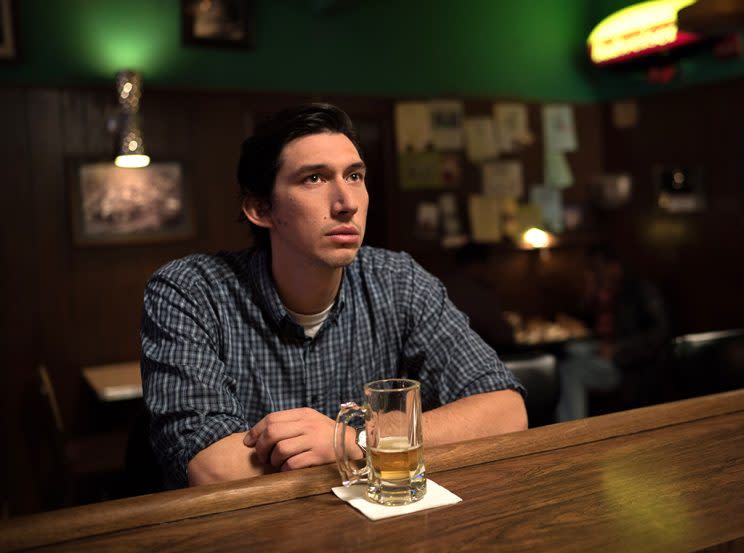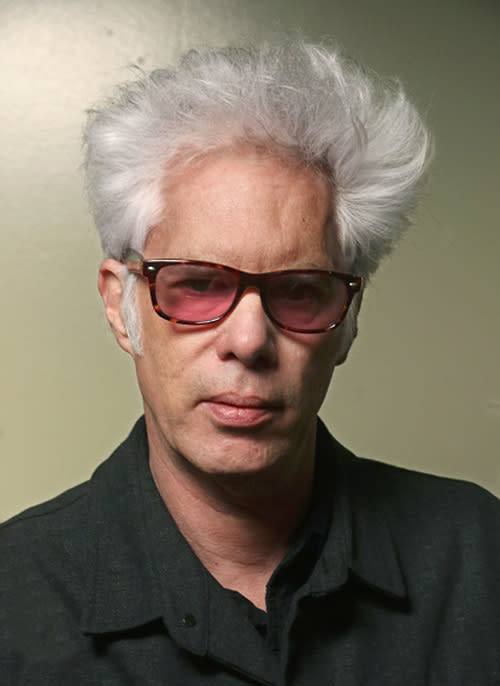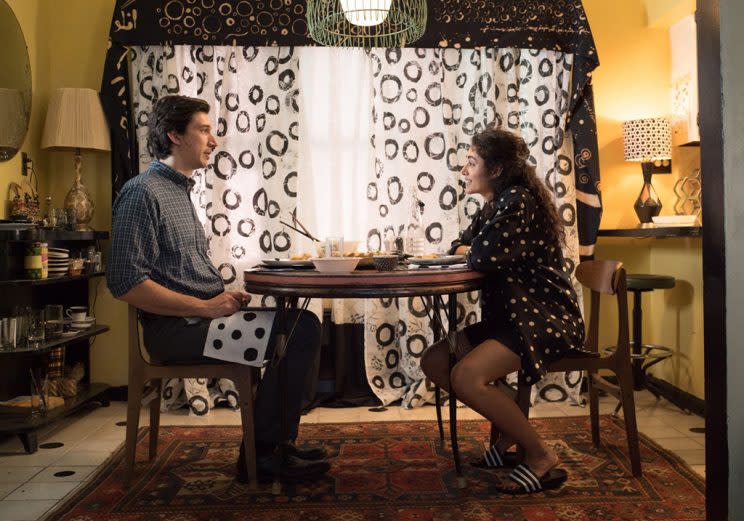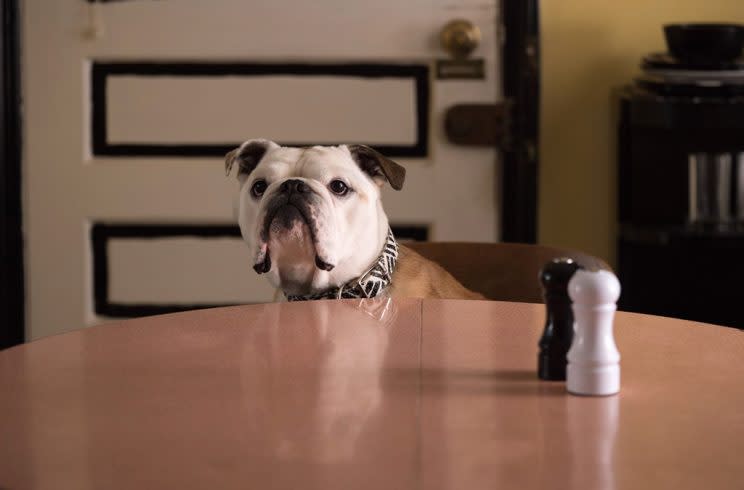'Paterson' Director Jim Jarmusch on His 'Film in the Form of a Poem' Starring Adam Driver, and a Look Back at Past Favorites

With his shock of white hair, eclectic artistic tastes, and longtime presence on New York City’s Lower East Side, Jim Jarmusch remains an aspirational figure for would-be Gotham hipster poets. It’s a status the writer/director has held since the early 1980s, when his scruffy low budget movies like Permanent Vacation and Stranger than Paradise enraptured audiences, preserving a period in Manhattan’s artistic and youth culture that, seen today, almost appears to be taking place on a different planet. Of course, the filmmaker’s canvas has long since broadened beyond his local stomping ground. Celebrated films like Down by Law, Mystery Train, Night on Earth, and Only Lovers Left Alive have taken him to other cities and countries, illustrating how his unique, dryly funny point of view travels well.
For his latest feature, Paterson — which opened in limited release on Dec. 28 and goes into theaters across the map this month — Jarmusch joins New York’s bridge-and-tunnel crowd, commuting across the Hudson to the titular New Jersey town, most famous as the birthplace of Lou Costello. Paterson also happens to be the name of the film’s main character, a bus driver and poet (Adam Driver) who finds creative inspiration, rather than frustration, in the daily grind of his work routine. It’s no accident that there are two Patersons in Paterson; the entire film is suffused with visual couplets, as if we’re watching one of the driver’s (or would that be Driver’s?) poems being written on screen in front of our eyes. Yahoo Movies spoke with Jarmusch about finding poetry in everyday life, his endless love for the Wu-Tang Clan, and his other 2016 film, the Iggy Pop and the Stooges documentary Gimme Danger.

As befits a movie about a poet, Paterson’s structure is very poetic, with each day almost resembling the stanza of a poem. Was that always your conceit?
I think it’s a film in the form of a poem rather than a poem in the form of a film, if that makes any sense. One of my favorite things in all art forms is variations, whether it’s in the music of Bach or in the work of Andy Warhol. And obviously a simple metaphor for variations are the days of the week and how things change slightly [from day-to-day]. In this film, the variations involve a guy who’s very much tied to his routine. He likes not thinking about what’s he going to wear, what time he gets to work, or what he’s going to do after dinner. I think that’s why he’s able to drift and be a poet, because he doesn’t have to worry about any of that. It’s already set for him.
The poetic nature of the film also applies to Paterson’s relationship with his wife Laura, played by Golshifteh Farahani. Even though they have wildly different attitudes toward creativity, those perspectives actually complement each other. It’s as if they rhyme, after a fashion.
Yeah, I think there’s a yin-yang thing about them that makes them have a very compatible kind of love story. And you see that same sort of rhyme in other scenes, like with the twins that keep re-appearing. They’re a little motif woven in there without intended meaning; I didn’t want it to pay off in the end like, “Laura pregnant with twins.” Or the scene with the guys in the car who warn Paterson that his dog could get stolen. I didn’t want them to be dog-jackers; I was intentionally not having some of these things pay off in the expected way.
There’s even some rhyming with your own filmography. I’m thinking of the scene toward the end of the film featuring the Japanese actor, Masatoshi Nagase, who appeared in your 1989 film, Mystery Train.
It becomes that, but that wasn’t my intention. I usually write scripts for specific actors and hope that then I can trick them into doing it somehow. The only actor I did intend [to cast] while I was writing was Masatoshi. I thought, “Now he’s a middle-aged guy, and he’s a wonderful actor — what a great chance I would have to have him be the angelic character that appears here.”
Do you think of your characters as inhabiting the same universe?
No, I really don’t think that way. In this case, there are some similarities. In Mystery Train, Masatoshi played a young guy on a rock and roll pilgrimage, and this time, his character is on a kind of William Carlos Williams pilgrimage. So there’s something in there, but I try not to analyze that too much.
So we’ll never see Ghost Dog team up with the Lone Man from The Limits of Control, for example.
I don’t know, maybe! The only time I really did that on purpose was in Dead Man where Gary Farmer played Nobody in that film, and in the end he was killed. I was very upset to have him killed somehow! So I brought him back in a totally different century in Ghost Dog where he’s on a rooftop in Jersey City. I consciously did that, because I didn’t want to think of him as being dead. [Laughs]

You mentioned that you like to write your scripts with actors already in mind. Was that the case with Adam Driver?
Oddly, I didn’t write for him or Golshifteh, but as I was trying to figure out the ideal actor, I told our casting director, Ellen Lewis, that I’d like to meet Adam. I’d only seen him in a few things: Inside Llewyn Davis, Frances Ha, and Girls, but I heard some interviews with him and I was like, “I just want to meet this guy.” He was the perfect guy to be Paterson. He’s a wonderful actor, and he’s a bit like Paterson in that he’s very observational as a person. He’s not analytical, like myself. He doesn’t overthink things, he approaches a character by getting a handle on that person and then just trying to react as that person in each scene. He has a wonderful presence and voice and face, and he’s a very compassionate person with a kind of nice, sort of reserved sense of humor.
He’s almost upstaged by the movie’s scene-stealing canine performer, Nellie, who plays the couple’s dog, Marvin.
Yes, Nellie. She played transgender in the film. She was a shelter dog, and had incredible trainers. We got all of her scenes with little trouble. We loved having her on our set and in our film. The crew wasn’t really allowed to interact with her, because she needs to have her trainers be the ones that she listens to, as well the actors that she’s working with. Marvin is their surrogate child in a way, and the character has quite a strong personality, so Nellie pulled that off really well. [Nellie passed away before the film’s premiere at the Cannes Film Festival, where she won the “Palm Dog” award posthumously.]

Paterson, the city, is another character in the film. Did you shoot on location?
I wanted to shoot everything in Paterson, but for tax credit purposes, I was limited. This isn’t social realism, so I wanted to create an imagined Paterson that still had the feel of the real place. Obviously, the waterfalls and the bus depot are Paterson, but we shot several scenes in Yonkers and the bar where Paterson goes is in Queens.
It’s always fun to see members of the Wu-Tang Clan pop up in your movies, like Method Man in Paterson. Are you always thinking of ways to include them?
I’m a big Wu-Tang fan, so my collaborations with RZA and GZA meant a lot to me. And I’ve hung out with Ghostface and Raekwon at certain points, too. So this time, I asked Method Man to do a little thing, and he wrote his rap himself, and even quoted William Carlos Williams all on his own. They’re a collective of brilliant, incredible people; I love their innovations, philosophies, and investigations into martial arts culture. They’re like Iggy Pop in that they’re intellectuals without being refined by academics. Wu-Tang forever! [Laughs]
Speaking of Iggy Pop, you collaborated with him this year on the documentary, Gimme Danger, which covers the story of his band, The Stooges.
The Stooges are very important to me, so I wanted to make a film celebrating them. It’s not like one of these documentaries that’s looking for all the dirt you could find. It’s really more about, “Where did this music come from? Where did these guys come from? How were they treated? What do they give us?” That was a fun film to make. While we were shooting Paterson, I talked to Iggy on the phone, and he said, “I was voted the sexiest man alive by the Paterson Girls Club of 1970.” I said, “Come on, really?” Then we looked it up and he was! So I put that in Paterson. He’s currently up for a Golden Globe for a song he wrote for the movie Gold, and also a Grammy Award for his album, Post Pop Depression. He’s worth a lot in prizes, that guy. That’s in one of his songs: “I’m worth a million in prizes.”
His collaboration with David Bowie is mentioned in passing in the film, but not really explored. Do you hope to make a separate documentary about that period in his career?
Well, our film was about The Stooges. If I wanted to make a film about Iggy Pop’s entire career, that would be 12 hours long! Bowie’s mentioned because he was involved in the last Stooges record, Raw Power, but a lot of the real collaborations between Bowie and Iggy came after The Stooges, so that was not the content of our film. He made incredible stuff when they went to Berlin together. Bowie even played keyboards with Iggy’s band during one tour, and did backup vocals.
Ghost Dog is a film that’s had a long cultural afterlife. Are there other films you’ve made that people are still eager to discuss with you?
Dead Man comes up a lot; that one seems to resonate. It’s a favorite of mine, and there’s something about it that invites repeat viewings. We tried to put a lot of layers into it, including comedy and very dark historical things. It took a lot of work by all of us to get that damned thing made! RZA, Forest Whitaker, and I are actually trying to do a TV show based on Ghost Dog now. There’s even a script for the pilot, which I love. I didn’t write it, but it’s fantastic so I’m hoping that might happen.
One of my favorites of yours is The Limits of Control, which I think was undervalued when it was originally released. It plays like an anti-Jason Bourne spy movie.
That was another case of us trying to not satisfy expectations. Much more so than Paterson actually, because there isn’t a lot of plot in The Limits of Control and there isn’t really any action. It’s more of an atmosphere that we wanted to see. We thought, “Can you make an interesting film without fulfilling those expectations?” And some people will say, “No, you did not!” [Laughs] Others sort of found a connection to it. I’m proud of that one, too. It was an interesting experiment.


